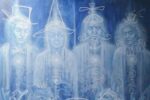WHO ELSE, IF NOT JESUS? (XV)
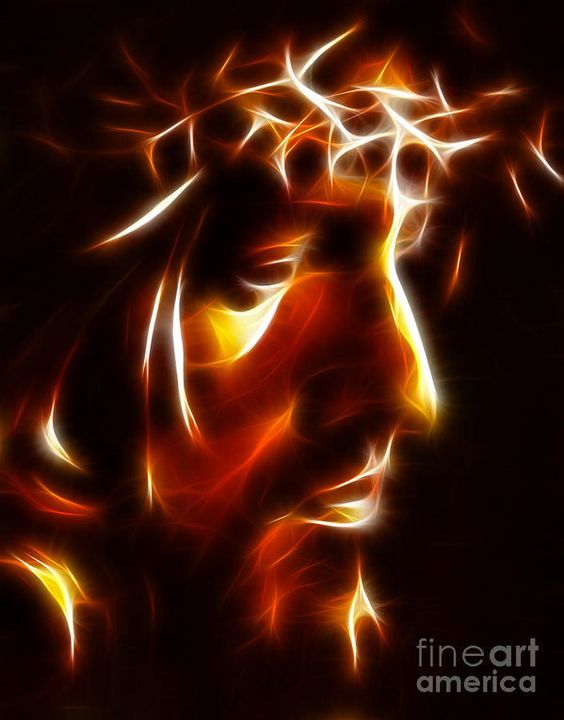
Jesus the LORD, the Amen; very God of very God!
(XV)
(…continues from part 14…)
The gnostic inclination of Cerinthus taught that Christ was a mere consciousness and that, it can come upon anyone. That after the death of whomever it descended upon, it just left him. Scriptural aberration. Christ is not a consciousness –this is the gospel truth. Christ is a physical Being. John 1:1-14 gives a dead-on revelation of Jesus. Verse one says, “In the beginning was the Word, and the Word was with God, and the Word was God.” Verse 14, “And the Word was made flesh, and dwelt among us, (and we beheld his glory, the glory as of the only begotten of the Father,) full of grace and truth.” The word ‘beginning’ arche (ar-khay’), means: ‘1. (properly abstract) a commencement 2. (concretely) chief (in various applications of order, time, place, or rank).’ This chronological eventuality goes beyond the existence of any entity of creationism. The word ‘made’ of verse 14 is ginomai (ghin’-om-ai) ‘1. to cause to be (“gen”-erate) 2. (reflexively) to become (come into being).’ This ginomai is not of creation. The ‘Word,’ Jesus Christ, was not ‘made.’ He ‘became’ a human: The Second Member of the Godhead, Christ was, heretofore, not Adamic.
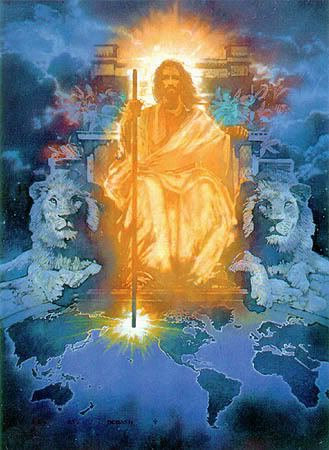
“He shall rule them with a rod of iron” (Rev. 19:15)
Take a good look at John 1:1, there are two that are of the Deity. How can there be two, each of Whom is God, in verse one? Simple! We have to go back to Genesis. Chapter one of verse one reads: “In the beginning God created the heaven and the earth.” The sobriquet ‘God’ in Hebrew is ‘Elohiym (el-o-heem’): ‘1. gods in the ordinary sense 2. but specifically used (in the plural thus, especially with the article) of the supreme God 3. occasionally applied by way of deference to magistrates 4. and sometimes as a superlative.’ If it is plural, then the Trinity was involved in creationism. Is there a singular form of the Hebraic ‘Elohiym? Yes, it is ‘Elowahh (el-o’-ah; rarely (shortened) >eloahh {el-o’-ah}) ‘a deity or the Deity.’ ‘Elowahh appears 56 times in the Old Testament, 51 of it are in reference to Jehovah God.

Gone back to the sinfulness of your nature, Mr. New Ager.
Eclecticism and self-spirituality
The New Age places strong emphasis on the idea that the individual and their own experiences are the primary source of authority on spiritual matters. [120] It exhibits what Heelas termed “unmediated individualism”, [121] and reflects a world-view that is “radically democratic”. [122] It places an emphasis on the freedom and autonomy of the individual. [123] This emphasis has led to ethical disagreements; some New Agers believe helping others is beneficial, although another view is that doing so encourages dependency and conflicts with a reliance on the self. [124] Nevertheless, within the New Age, there are differences in the role accorded to voices of authority outside of the self. [125] Hammer stated that “a belief in the existence of a core or true Self” is a “recurring theme” in New Age texts. [126] The concept of “personal growth” is also greatly emphasised among New Agers, [127] while Heelas noted that “for participants spirituality is life-itself”. [128] (Wikipedia)

“…all our righteousnesses are as filthy rags” (Isaiah 64:6)
What is Eclecticism? It is making of decisions on the basis of what seems best instead of following some single doctrine or style. They have no regard for the word of God. They will not read the Bible for divine nuggets of truth. Romans 3:23“For all have sinned, and come short of the glory of God;” Isaiah 64:6, “But we are all as an unclean thing, and all our righteousnesses are as filthy rags; and we all do fade as a leaf; and our iniquities, like the wind, have taken us away.” The word ‘filthy’ is the Hebraic `ed (ayd) a noun feminine meaning: ‘1. the menstrual flux (as periodical). 2. (by implication) (in plural) soiling.’ Rags is beged (behg’-ed) ‘1. a covering. 2. clothing.’ This is how pathetic those who think they can be righteous through human good deeds. The New Agers need to come to a conscious understanding that got dawned on His disciples as we have it in Matthew 19:27, “Then answered Peter and said unto him, Behold, we have forsaken all, and followed thee; what shall we have therefore?” The New Age Spirituality adherents have not experienced spiritual rejuvenation, solely of the Holy Spirit, ergo, they will bemock the words of Jesus, who teaches: “I am the vine, ye are the branches: He that abideth in me, and I in him, the same bringeth forth much fruit: for without me ye can do nothing” (John 15:5).

Spiritual delusion of New Age
New Age religiosity is typified by its eclecticism. [129] Generally believing that there is no one true way to pursue spirituality,[130] New Agers develop their own worldview “by combining bits and pieces to form their own individual mix”, [131] seeking what Drury called “a spirituality without borders or confining dogmas”. [132] The anthropologist David J. Hess noted that in his experience, a common attitude among New Agers was that “any alternative spiritual path is good because it is spiritual and alternative”. [133] This approach that has generated a common jibe that New Age represents “supermarket spirituality”. [134] York suggested that this eclecticism stemmed from the New Age’s origins within late modern capitalism, with New Agers subscribing to a belief in a free market of spiritual ideas as a parallel to a free market in economics. [135] (Wikipedia)
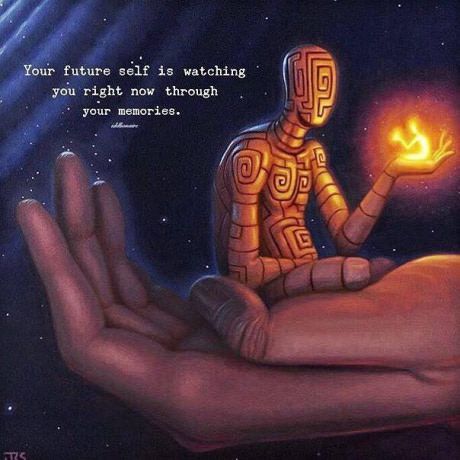
Can your future-self take you to eternal bliss?
The Creator of heaven and the earth says in unequivocal terms in John 14:6, “Jesus saith unto him, I am the way, the truth, and the life: no man cometh unto the Father, but by me.” Let us do a perlustration of the key words. ‘I am’ is made of ego (eg-o’) ‘(emphatically, of the first person) I’ & eimi (ei-mee’) ‘I exist {used only when emphatic}.’ Now, ego eimi is exactly what God told Moses when He gave His name ‘I AM THAT I AM.’ Hodos (hod-os’) is the Greek for ‘way,’ meaning: ‘1. a road 2. (by implication) a progress (the route, act or distance) 3. (figuratively) a mode, means or destiny.’ ‘Truth’ is aletheia (al-ay’-thei-a): ‘verity i.e. reality. It comes from the roots of: ‘a’ –negative not– and lanthano (lan-than’-o) ‘1. to lie hid 2. (adverbially, often) unwittingly.’ ‘Life’ is zoe (dzow-ay’) ‘1. life-above 2. epithet of Jesus (John 14).’ Jesus is not just any everyday person. He is the 2nd Member of the Godhead. He is: our destiny, the real God and the unending life of righteousness. Amen!
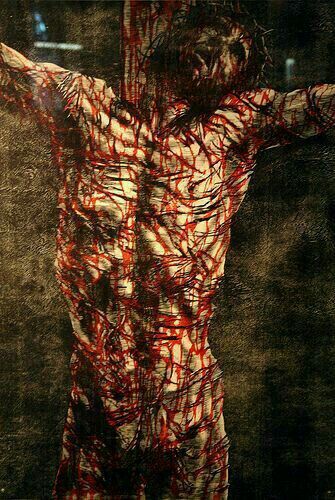
wounded for our transgressions… bruised for our iniquities: Isa 53:5
Getting born again is strictly a conscious effort on the part of an individual. It is of a personal conviction that, as the word of God says, Jesus is truly the only Saviour of the world. A soteriological dependence on the finished work of Jesus is the sole belief requirement of Scripture. Get born again by saying this simple prayer.
“Dear heavenly Father, I come to You now in the name of Jesus Christ. I believe in my heart that Jesus is the Son of God. I believe that Jesus died on the cross for my sin. I believe that You raised Him from the dead. I confess with my mouth that Jesus is Lord and I receive Him now as my Lord and my Saviour. I give God all the glory. Amen!”
(…to be continued…)
Click here to read part 16
Visits: 113
